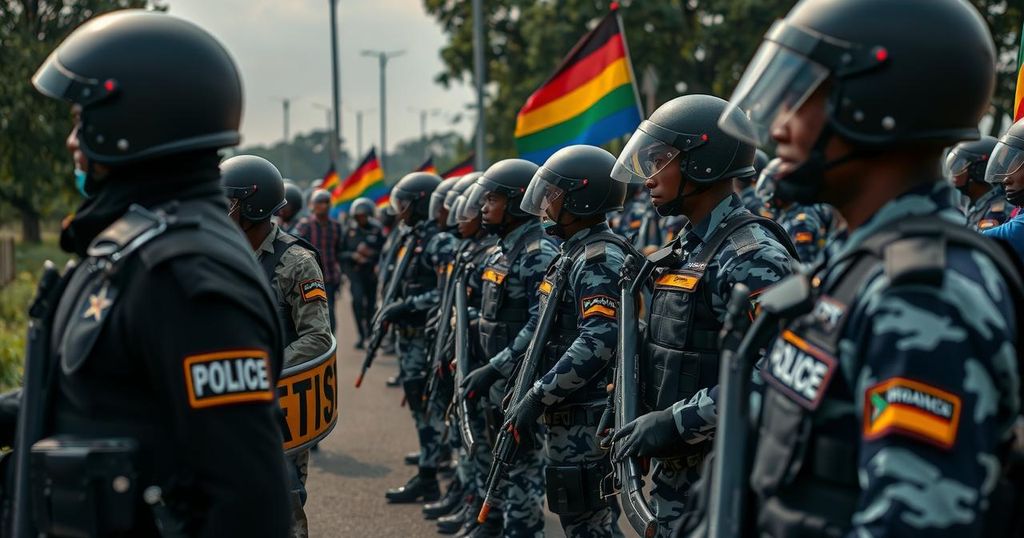Politics
AFRICA, ANTONIO, ANTONIO JUAQIM, BBC, COMMISSION, DANIEL CHAPO, DEMOCRACY, ELECTIONS, FR, FRELIMO, MANUEL SAMUEL, MAPUTO, MON, MONDLANE, MOZAMBIQUE, OPPOSITION, PROTESTS, RENAMO, SAMUEL, SAO FRANCISCO XAVIER, SÃO FRANCISCO XAVIER CEMETERY, VE, VENÂNCIO MONDLANE, VIOLENCE
Isaac Bennett
0 Comments
Mozambique Political Unrest: Fatalities Amid Protests Against Election Results
The political crisis in Mozambique escalates as police violence against protesters leads to the deaths of several individuals, including children. Demonstrations, ignited by allegations of electoral fraud following Frelimo’s claimed victory in the presidential election, have sparked nightly protests across Maputo. The tragic toll of this unrest underscores growing public demand for accountability and reform within the political system, particularly from the youth, who seek a better future in their nation.
In Mozambique’s capital, Maputo, a significant tragedy unfolded following the recent presidential election, which many believe was marred by rigging. During a protest organized in response to the declared victory of Frelimo and its candidate Daniel Chapo, fourteen-year-old Antonio Juaqim was tragically killed by police. His death, along with that of other young protesters, has ignited public outrage and sparked ongoing demonstrations, with citizens banging pots and pans at nightly vigils to reject Frelimo’s extended rule. Amid a backdrop of purported electoral fraud allegations from opposition leaders, the government’s response has been met with fierce criticism, raising concerns over police brutality and the escalation of violence against demonstrators, including children.
The protests emerged after the Mozambican electoral commission declared Frelimo the winner of the October elections with a 71% vote share, which opposition candidate Venâncio Mondlane publicly condemned as fraudulent. In response to the situation, Mondlane has incited citizens to participate in nightly demonstrations to voice their dissent against the election results. However, these protests have turned deadly, with reports indicating that police have killed at least 40 individuals, including minors, during clashes with protesters. The law enforcement response has been contentious, with police commander Bernadino Raphael attributing the violence to the protesters themselves, including claims that they are using children as shields in confrontations with law enforcement.
Despite assertions of police acting in self-defense, human rights organizations, including Human Rights Watch, have criticized the excessive use of force during what began as peaceful expressions of discontent. The company of grieving children mourning their lost friends highlights the deep emotional toll this violence exacts on young communities, underlining the urgency of addressing the societal ramifications of political unrest.
As Mozambicans continue to protest against the political landscape dominated by Frelimo, the sentiments of disillusionment among the youth become increasingly palpable. Many young people express a desire for financial independence and better opportunities, feeling disconnected from their government, which they perceive as being out of touch. This unfortunate crisis illustrates the critical intersection between political dissatisfaction and the need for accountability in a society struggling to emerge from decades of authoritarian rule.
Through peaceful protests and social media engagement, citizens remain committed to demanding justice and accountability for those lost in these tragic events, highlighting the broader struggle for democratic governance and human rights in Mozambique.
Mozambique has been experiencing significant political turmoil following the recent presidential election held in October 2023, in which the ruling party, Frelimo, claimed a controversial victory. This declaration has been met with widespread claims of fraud by the opposition, particularly from Venâncio Mondlane, who had previously parted ways with the main opposition party, Renamo. Amidst this backdrop, a wave of protests arose, reflecting public dissatisfaction with the electoral process and the continuation of Frelimo’s long-standing rule since the country’s independence. The protests highlight a growing demand for political change, especially among the youth, and have escalated into violent confrontations with police, resulting in numerous fatalities and injuries.
The ongoing crisis in Mozambique following the recent presidential election has brought critical issues of electoral integrity and political violence to the forefront. The tragic deaths of young protesters, including Antonio Juaqim, emphasize the urgent need for accountability and reforms in the political system. Citizens, particularly the youth, are increasingly voicing their discontent with the ruling party, Frelimo, signaling a desire for meaningful change and a just society. This situation necessitates further scrutiny and engagement from the international community, as the future of Mozambique hangs in a delicate balance between democracy and continued authoritarianism.
Original Source: www.bbc.com




Post Comment